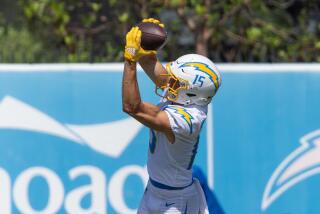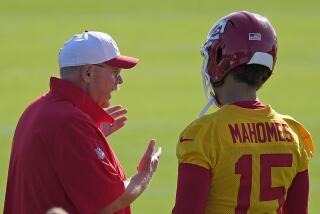PRO FOOTBALL NOTES : Picking Right Agent Key for NFL Rookies
- Share via
There is a sense of panic out there among college players, many of whom believe they have been shafted by the tentative collective bargaining settlement. The agreement includes a rookie salary cap, which is the cause for their concern.
A little advice here: Don’t panic. If you’re a premier college player, you are going to make the big bucks. You’re still going to get a fat signing bonus.
But if you already have selected an agent--or you’re about to make that decision--you better re-evaluate that person and make certain you have the right representative.
A good agent is going to be more critical than ever because an experienced and skilled negotiator can make a difference under this system.
First, the NFL draft will last seven rounds. Second, the 28 NFL clubs will divide $56 million to sign all rookies, based on 3.5% of designated gross revenues. The $56 million is the average spent by the league on rookies during the previous three years.
The idea here is to freeze the spending levels. Then as revenues increase each year, the additional profits will have to be spent on veteran players. That actually is good news for rookies--with experience plus performance, they can collect on that extra money in their next contract.
The $56 million averages at $2 million per club, which doesn’t sound like a lot. It’s not that simple, which is why it’s necessary to hire a good agent. The $56 million will be allocated based on a team’s draft position--teams drafting early will get more money to sign players than teams drafting late.
“Potentially, there is not a great diminution on total dollars available that first year,” said Tom Condon, an agent who has monitored the labor negotiations. “What can occur is that the dollars may be distributed differently.”
Signing bonuses might shrink slightly, but the structure of players’ contracts will be important. Signing bonuses will be prorated under this plan. In other words, if a player gets a $2 million signing bonus over four years, only $500,000 will count against the rookie cap. The remaining amount of the money will count the following years under the regular salary cap.
Would Steve Emtman still have gotten a $4 million signing bonus from the Indianapolis Colts under this system? Yes, but the payout would have been structured differently.
“What we’re going to see is more clubs hiring financial experts to negotiate contracts,” says one general manager who did not want to comment publicly until the labor deal was official. “These agents who leaned on the old slotting system are in trouble. They’re going to have some unhappy clients if they don’t watch it.”
Six general managers--three in the National Football Conference, three in the American Football Conference--say the best negotiators in the NFL are (alphabetically) Ralph Cindrich, Tom Condon and Marvin Demoff. This doesn’t mean there aren’t other qualified negotiators. Others mentioned include Tony Agnone, Richard Howell, Jack Mills, Eugene Parker, Jim Steiner, Leigh Steinberg, Mike Sullivan, Randy Vataha and Steve Zucker.
One G.M. says what scares him most is “now we’ll become a league controlled by agents--just like baseball.”
Condon says, “This is a much better system for the football players, but it will be substantially different than baseball. We have a salary cap, baseball does not. Baseball has arbitration, we do not. We definitely get more leverage for a player now, but we’ve got to be better prepared.”
If a college player has a doubt about an agent, he shouldn’t ignore the fact that many universities offer assistance in screening contract advisers. Plenty of information on good and bad agents are available--if you care enough. And you better care. Or you’re going to be a little lighter in the wallet for your ignorance.
One man’s All-Pro ballot:
Offense: Steve Young, 49ers, quarterback; Emmitt Smith, Cowboys, and Barry Foster, Steelers, running backs; Jerry Rice, 49ers, and Sterling Sharpe, Packers, wide receivers; Jay Novacek, Cowboys, tight end; Harris Barton and Steve Wallace, 49ers, tackles; Randall McDaniel, Vikings, and Steve Wisniewski, Raiders, guards; Mark Stepnoski, Cowboys, center; Morten Andersen, Saints, kicker.
Defense: Chris Doleman, Vikings, and Neil Smith, Chiefs, ends; Ray Childress, Oilers, and Cortez Kennedy, Seahawks, tackles; Wilber Marshall, Redskins, and Rickey Jackson, Saints, outside linebackers; Junior Seau, Chargers, and Sam Mills, Saints, inside linebackers; Rod Woodson, Steelers, and Deion Sanders, Falcons, cornerbacks; Henry Jones, Bills, and Tim McDonald, Cardinals, safeties; Rich Camarillo, Cardinals, punter.
Offensive Player of the Year: Young.
Defensive Player of the Year: Seau.
Rookie of the Year: Dale Carter, Chiefs.
Several general managers think Los Angeles Raiders running back Marcus Allen, 32, will be a valuable free agent. “For one thing, he’s got fresh legs for a guy that age,” one G.M. says. Expect the cross-town Rams to make a strong pitch for Allen.
More to Read
Go beyond the scoreboard
Get the latest on L.A.'s teams in the daily Sports Report newsletter.
You may occasionally receive promotional content from the Los Angeles Times.










